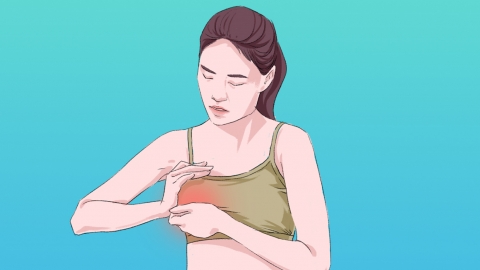What does it mean when menstruation is delayed and breast pain has stopped?
Generally, delayed menstruation and the absence of breast pain may be caused by emotional fluctuations, irregular lifestyle, polycystic ovary syndrome (PCOS), hyperprolactinemia, or diminished ovarian function. It is recommended to seek medical attention promptly to identify the underlying cause and receive appropriate treatment under a doctor's guidance. Detailed analysis is as follows:

1. Emotional fluctuations: Recent experiences of anxiety, stress, or emotional strain can disrupt the endocrine system, leading to delayed menstruation. Hormonal fluctuations may also reduce breast tenderness. No specific treatment is required; mood regulation through listening to music, exercise, and communication with others can help maintain emotional well-being.
2. Irregular lifestyle: Chronic sleep deprivation, excessive fatigue, and irregular eating habits can impair the function of the hypothalamic-pituitary-ovarian axis, resulting in delayed menstruation and the disappearance of breast pain. Adjusting lifestyle habits—such as ensuring 7–8 hours of sleep per night, avoiding late nights, and maintaining a balanced diet—can help restore normal function.
3. Polycystic ovary syndrome (PCOS): Elevated levels of androgens and ovulatory dysfunction can lead to delayed menstruation or even amenorrhea. Hormonal imbalances may also reduce breast tenderness, often accompanied by symptoms such as hirsutism and acne. Patients should follow medical advice to use medications like ethinylestradiol cyproterone acetate tablets, drospirenone-ethinyl estradiol tablets, or metformin hydrochloride tablets to regulate hormones, improve metabolism, and restore regular menstrual cycles.
4. Hyperprolactinemia: Excessively high prolactin levels can suppress ovulation, causing delayed menstruation, and interfere with estrogen secretion, thereby alleviating breast pain. This condition may also present with galactorrhea (milky discharge from the breasts). Patients should follow medical instructions to take medications such as bromocriptine mesylate tablets, vitamin B6 tablets, or cabergoline tablets to lower prolactin levels and restore normal ovulation and menstrual cycles.
5. Diminished ovarian function: Reduced hormone production by the ovaries leads to lower estrogen levels, resulting in delayed menstruation and decreased menstrual flow. Breast tenderness may disappear due to lack of hormonal stimulation, and symptoms such as hot flashes and insomnia may also occur. Under medical supervision, patients may use medications such as estradiol valerate tablets, progesterone soft capsules, or conjugated estrogens tablets to supplement hormones, improve ovarian function, and regulate the menstrual cycle.
In daily life, it is important to monitor changes in the menstrual cycle, record the duration of delays and any accompanying symptoms, to provide detailed information during medical consultations. Maintain good genital hygiene, avoid extreme dieting or overeating, and maintain a healthy body weight to support endocrine stability.




